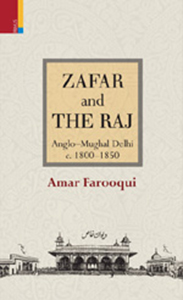
ZAFAR AND THE RAJ: Anglo-Mughal Delhi c. 1800-1850
AUTHOR- Amar Farooqui
| PB ₹450 |
||
INFORMATION
- AUTHOR : Amar Farooqui
- PB ISBN : 978-93-5572-138-9
- Year : 2023
- Extent : xiv + 220pp
- Discount available on checkout
- Usually dispatched within 3 to 5 working days.
INFORMATION
- AUTHOR –
- HB ISBN : 995
- PB ISBN :
- POD ISBN :
- ISBN – 978-93-80607-92-4
- Year – 2013
- Extent: 400 + 40 coloured illustrations
- 10% discount + free shipping
- Usually dispatched within 3 to 5 working days.
Zafar and the Raj is a study of the formative phase of the history of colonial Delhi, a phase that from its duality, social and political, may be referred to as Anglo-Mughal. From 1803 onwards there were actually two centres of authority in the imperial city: the Residency and the Palace. The competing influence of the Palace determined the manner in which colonial authority was established in Delhi—and marked the limits of this authority. Simultaneously, the association of the Mughal emperor’s name with Delhi, combined with the participation in fin-de-siècle Mughal court ritual by the East India Company’s officials, was to shape the colonial perception of Delhi as the premier imperial city of the subcontinent. Information available in the colonial archive about emperor Bahadur Shah Zafar (1775-1862; r. 1837-57), and his two immediate predecessors, is used to reconstruct the history of the city in the late eighteenth and early nineteenth centuries, focussing on the period c. 1803-1857.
This book is also a political biography of Zafar. It aims to present the story of his life not, as is typical, from the perspective of the revolt of 1857, but in terms of Zafar as a prominent local aristocratic figure who was part of the Urdu-speaking urban elite of the first half of the nineteenth century. The ways in which his life, coping as it was with the Raj, intersected with that of several figures that belonged to this class, tells us much about India’s encounter with colonialism. In the process we get to know something about the intertwined destinies of, among others, Akbar Shah, Azurda, Chiman Lal, Ghalib, Rammohun Roy, Shamsuddin, Vazir Khanam and, of course, Zafar.
The Author
Amar Farooqui is Professor in the Department of History, University of Delhi. He taught history for many years at Hans Raj College, Delhi; and has been Fellow, Nehru Memorial Museum and Library, New Delhi. His publications include Early Social Formations (2002); Smuggling as Subversion: Colonialism, Indian Merchants and the Politics of Opium, 1790-1843 (new edition, 2005); Opium City: The Making of Early Victorian Bombay (2006); and Sindias and the Raj: Princely Gwalior c. 1800-1850 (2011).
Bihar and Jharkhand have been the arena of diverse social and political struggles since colonial times. The formation of the state of Jharkhand, which was earlier a part of Bihar and known as Chotanagpur, has been the result of movements for statehood, some of which have not only created a democratic space in these regions, but also brought about a paradigm shift in Indian politics.
Colonial and Contemporary Bihar and Jharkhand tries to capture the complexities of some of these diverse movements. The ‘articulation’ of tribal protests and the problems faced by backward castes have been problematized by the emergence of internal hierarchies, differentiations and contestations. The predicament of ethnic identity and culture in the face of unrestrained globalizing forces in the tribal belt requires further examination. Bihar and Jharkhand also have a rich popular/subaltern culture, which has been overshadowed and eclipsed in most of the scholarly work on this region. This book highlights how popular culture and oral cultural traditions emerged as a site for multiple articulations, of marginalization, as well as resistance and subversion. This collection of essays will appeal to those interested in social history, political and cultural studies and the world of the poor and the marginalized.
The Editors
Lata Singh is Associate Professor, Maitreyi College, University of Delhi. She is the author of Popular Translations of Nationalism: Bihar, 1920-1922 (2012) and has edited Theatre in Colonial India: Play-House of Power (2009).
Biswamoy Pati is Associate Professor in Modern Indian History, University of Delhi. His latest publications include South Asia from the Margins: Echoes of Orissa, 1800-2000 (2012).
Contributors
Imtiaz Ahmad l Kamal Nayan Choubey l Vinita Damodaran l Sanjukta Das Gupta l Dev N. Pathak Biswamoy Pati l Mrityunjay Prabhakar l Amit Prakash l Sandali P. Sharma l P.K. Shukla l Lata Singh l Shashank S. Sinha




